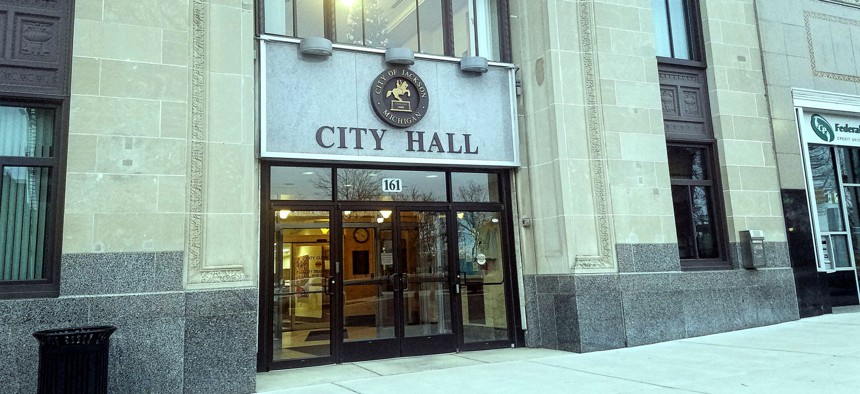Fiscally Strained Michigan Municipalities Face a ‘Perfect Storm’

City Hall in Jackson, Michigan Michael Grass / RouteFifty.com

Connecting state and local government leaders
“We cannot succeed as a state if we do not have fiscally strong communities,” according to the Michigan Municipal League’s associate executive director.
Local governments across Michigan are under financial pressure from retiree health care expenses, infrastructure costs and state policies restricting their revenues.
That’s according to the Michigan Municipal League. As a new legislative session gets underway in Lansing, the group is renewing a push to work with state lawmakers to address some of the fiscal difficulties confronting cities, towns and other localities in Michigan.
“We have, I think, a perfect storm,” Tony Minghine, the league’s associate executive director and chief operating officer said by phone Tuesday, as he discussed the circumstances surrounding the finances of local governments in the state. “It’s really creating a crisis in Michigan.” He added: “We cannot succeed as a state if we do not have fiscally strong communities.”
Earlier in the day, the municipal league held a press conference in Lansing focused in part on financial problems facing cities in Michigan and how they might be solved.
Michigan’s local governments cover most of their costs for operations and services using revenues transferred from the state and property taxes, a new report from the municipal league explains.
But the report notes that revenue sharing was slashed in recent years amid state budget shortfalls. It adds that cities and villages lost over $7.5 billion in shared revenue since 2002. Property tax revenues, meanwhile, took a hit after property values declined during the Great Recession. And state statutes and constitutional provisions limit the rate at which they can grow.
On the cost side, the municipal league report highlights that health care benefits for retired public workers put significant financial weight on localities.
This health coverage typically makes up the bulk of so-called “other postemployment benefits,” or OPEB. A Michigan State University report from last year, citing figures from 2014, pegged unfunded OPEB liabilities for cities, villages and townships in Michigan at just over $7 billion.
That amount is not all due immediately. It represents the sum localities will need to come up with in the years ahead to pay health care costs and related benefits for retired public employees.
Infrastructure costs are an additional burden, according the municipal league. The group takes the position that the state has added too much new infrastructure given low population growth in Michigan in recent decades, while at the same time neglecting maintenance and upgrades.
“We’ve sort of done a build-and-abandon approach here,” Minghine said.
Gov. Rick Snyder touched on costs for local government pensions and retiree health care in his State of the State address last week. To help tackle these issues he called for a new work group, with representatives from the legislature, local governments and the public workforce.
“We have too much legacy liability in a number of our communities,” the Republican governor said, according to a transcript of his remarks. “We have 334 local units that provide retiree health care and pension, that have $14 billion dollars in unfunded liabilities.”
“These are local challenges that demand local input outside of the Lansing bubble,” Snyder added.
The municipal league seems ready to offer up the sort of input Snyder is looking for. But how much traction the group’s views will get among state lawmakers remains to be seen. The league warned early last year the system for funding local government in Michigan was in need of reform. Many of the issues raised then echoed those that the group pointed to on Tuesday.
PREVIOUSLY on Route Fifty:
Bill Lucia is a Senior Reporter for Government Executive's Route Fifty and is based in Washington, D.C.

NEXT STORY: Cost Sharing Among State Defined Benefit Pension Plans





